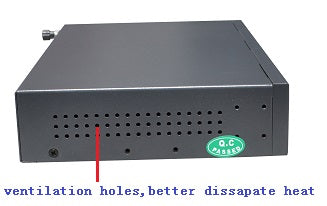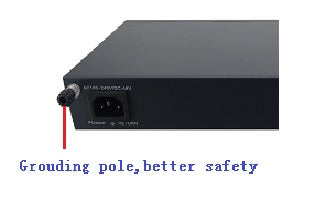As a cost effective solution for the traditional telecom services migrate to the IP packet networking technology, the E1 ethernet multiplexer adopts the innovative TDM over IP technology, it transports the legacy E1 data through the existing Gigabit Ethernet or IP network.
The 4E1 over ethernet multiplexer is the new generation of the TDM over IP equipment with IP circuit emulation that supports transportation of four E1/T1 and two local Ethernet ports over Ethernet or IP network. The multiple gigabit switches’ uplink ports and user data ports are IEEE 802.3 compliant, 10/100/1000BaseT auto-sensed Ethernet port.
The state-of-the-art design provides the highest availability with the accurate timing signal and data bit stream reconstruction. Predefined system parameter profiles that according to different application requirement; ultimately simplify the installation process and saving the maintenance cost.
Telecom and Enterprise users can save a lot of access and equipment costs and generates new revenue by offering different types of service over existing Ethernet networks. E1 ethernet multiplexer is also suitable for connecting to the wireless equipment to achieve fast deployment of E1 services. One particular application is to build E1/T1 links with low cost Wireless LAN bridges, replacing much more costly microwave radios. Operators can use BD-4E1-IP-G to provide legacy TDM services over wired or wireless packet network.


Features
1. User-friendly Web server supported for easy setup and maintenance
2. The TDM over IP device supports unframed structures SAToP protocol and framed structure CESoPSN non CAS protocol.
3. Four E1 Ports supported, E1 easy selected by Web Manager
4. Uplink ports 1+1 backup supported
5. Stable E1 clock recovery, low jitter and wander
6. Low processing delay for multiple gigabit switches’ E1 channels, high bandwidth usage efficiency
7. Resist to packet loss, with PCM frame synchronization protection
8. User definable encapsulation packet size for different application
9. Enough jitter buffer to resist packet delay variation (PDV)
10. Local Ethernet port throughput limiting, assuring E1 QoS
11. Local and remote E1 LOS and AIS and packet loss indication for trouble-shooting andmaintenance.
12. E1 clock supports 3 mode: local clock, adaptive and loopback
13. Ethernet built-in layer 2 switch, support VLAN(port based, 802.1Q based and QinQ based), QoS(port based, 8021.1P based, MAC based and TOS based).
14. Ethernet support IEEE 802.3x, RSTP (802.1w), LLDP, CDP, Ethernet ring protection, OAM and MAC address automatic learning